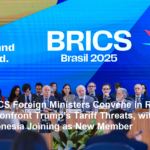Indonesia, under the leadership of Coordinating Minister for Economic Affairs Airlangga Hartarto, finds itself navigating a complex geopolitical landscape where fostering robust economic ties with both China and the United States presents a significant challenge. While acknowledging ongoing negotiations with the US regarding import tariffs, Minister Hartarto has asserted that economic relations with China remain strong and uninterrupted. This assertion highlights Indonesia’s strategic approach to maintaining economic stability and growth through diversification and careful management of its international partnerships.
The claim that economic relations with China remain robust is not merely political rhetoric. China has been a consistently significant trade and investment partner for Indonesia for several years. Bilateral trade encompasses a wide range of goods, from natural resources like coal and minerals to manufactured products. Moreover, China’s burgeoning Belt and Road Initiative (BRI) has spurred substantial infrastructure investment in Indonesia, particularly in areas like transportation and energy. This investment contributes significantly to Indonesia’s economic development goals, facilitating trade, improving connectivity, and creating employment opportunities.
Indonesia’s relationship with China is characterized by mutual economic benefit. China gains access to Indonesia’s rich natural resources and a growing consumer market, while Indonesia benefits from Chinese investment, technology transfer, and access to a large export market. This symbiotic relationship has fostered economic growth in both countries, and Minister Hartarto’s statement suggests a commitment to maintaining this beneficial partnership.
However, the Indonesian government is also actively pursuing enhanced economic ties with the United States. Negotiations regarding import tariffs with the US are a critical component of this strategy. Successfully negotiating favorable tariff terms could potentially boost Indonesian exports to the US market, further diversifying Indonesia’s export destinations and reducing its reliance on any single trading partner. A stronger economic partnership with the US could also unlock new opportunities for investment and technology transfer, bolstering Indonesia’s competitiveness on the global stage.
The challenge lies in managing these two crucial relationships without jeopardizing either. The US and China are engaged in ongoing geopolitical and economic competition, and Indonesia must tread carefully to avoid being caught in the crossfire. Maintaining a neutral stance and emphasizing the mutual benefits of economic cooperation with both countries is crucial. This requires skillful diplomacy and a clear articulation of Indonesia’s economic priorities.
Indonesia’s strategy seems to be predicated on the principle of diversification. By cultivating strong economic ties with multiple partners, including China, the US, and other nations, Indonesia can mitigate the risks associated with relying too heavily on any single market or investor. This approach allows Indonesia to maximize its economic potential while remaining resilient to external shocks and geopolitical fluctuations.
In conclusion, Minister Hartarto’s assertion that Indonesia’s economic relations with China remain strong despite ongoing tariff negotiations with the US reflects a pragmatic and strategic approach to international economic relations. By actively engaging with both global powerhouses and diversifying its economic partnerships, Indonesia aims to secure its long-term economic growth and stability. The success of this balancing act will depend on Indonesia’s ability to navigate the complex geopolitical landscape with foresight, diplomacy, and a clear focus on its national economic interests. The future will reveal whether Indonesia can successfully leverage its position as a key player in Southeast Asia to foster beneficial economic relationships with both the East and the West.









